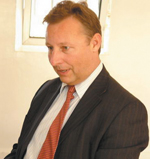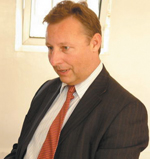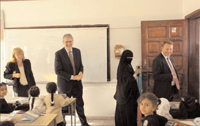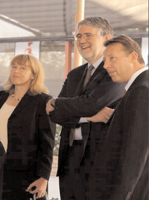
British Council Regional Director to Yemen Times:”Yemeni Chevening scholars are exceptionally impressive” [Archives:2008/1171/Reportage]
July 10 2008
 |
 |
 |
He joined the British Council in1994 when worked as BC Assistant Director in Saudi Arabia for three years. After that he worked in Poland and UK until he returned to ME region in 2004 as regional director based in UAE.
Lynes studied Russian and Polish and has an MA in Applied Linguistics. He spent his early career in the 1980s working as a linguist in Berlin. Following this he worked in Hungary, as Director of a School and at the Budapest University of Economics.
Lynes will be leaving by end of July to his new post in London as Deputy Director Operations.
Nadia Al-Sakkaf interviewed Rob Lynes on issues relating to the British Council policies in the region as a whole with focus on Yemen.
Every year, the number of candidates for the Yemeni Chevening scholarship candidates multiplies. This year there were over 200 applicants competing for 7 grants. I know that the Chevening scholarships are from the FCO – but the British Council itself used to grant scholarships, and they were very successful in Yemen. Don't you think Yemen deserves more opportunities?
It's true that the Chevening scholarships in Yemen have been particularly successful. My colleagues in the British Council in Yemen and in the Embassy have commented to me on the dedication, commitment and real ability of the candidates we interview every year for the opportunity which the FCO Chevening scheme offers for one year's fully-funded postgraduate scholarship to complete their MA degree. Every year, we succeed in finding places for Yemeni Chevening scholars at excellent British universities – LSE, Warwick, University College London, for instance – and every year they return with excellent results.
Last year, for instance, five Chevening scholars gained distinctions in their Master's degrees; the year before, one Yemeni was judged best in his year. And on their return, the Chevening scholars rise quickly on the career ladder in government, in the private sector and in civil society – we even find Chevening scholars as editors of Yemen's leading newspaper. I've met many of the ex-Chevening scholars on my visits to Yemen, and I agree that they are exceptionally impressive. Given this track record, we must agree that Yemen deserves opportunity and can benefit from that opportunity.
The FCO is currently revising its policy on Chevening scholarship and its allocations of places; we hope that this might result in more places available for those countries which will benefit most.
Although we provide many opportunities for Yemenis to study or to visit and make useful contacts in the UK every year, the British Council does not run open scholarship schemes similar to the Chevneing scholarship. We have in the past often administered scholarships for particular groups – for instance, in the past we sent ninety power industry engineers to the UK under a project of co-operation with the Overseas Development Administration – but the main competition for Yemeni applicants will remain the Chevening scheme. We're looking at co-funding for the Chevening scheme to see whether in this way too we can extend the numbers of scholarships available and will hope to see yet more opportunities for Yemen in the near future.
Has the recent security problems in Yemen affected your planning of future projects in Yemen?
We take seriously the recent changes in the security situation in Yemen. However, we also take very seriously our commitment to work with and for the people of Yemen and the links we can establish between Yemen and the UK.
We will be making some changes in project planning to reflect the current contingency, but we will not be diminishing our level of activity and our ongoing involvement in education, English language teaching, the arts and sciences. For instance, we are currently holding a major Hornby seminar on English in the Classroom for English language teachers from schools, with participation from teachers across the region but the majority from Yemen.
We had intended to hold this seminar in Sanaa; in view of the current situation, we have moved the place of the seminar to Qatar – and we will be supporting the travel for 30 Yemeni teachers from across the country to travel to Doha for this.
What happened to the British Council English classes? They used to be very popular and there is really a very great demand to re-establishing them in Yemen.
We have always worked in support of English language teaching and learning in Yemen, ever since we first opened our teaching centre in Aden in 1940. In some countries and at some times this has meant direct teaching in British Council teaching centres; in other places, we have concentrated our efforts on improving the provision of English in state school teaching and learning through supporting Ministry of Education reform programmes.
I know that the English classes in the British Council in Yemen were popular, and that many people learned their English with the British Council in Aden and in Sanaa. We have looked recently at the options for working in partnership with a Yemeni institution to deliver language classes together with teacher training options for English teachers to up date their methodology and study for international qualifications; the plans are currently on hold, but this partnership model is one we hope to develop at some point in the future. What we are doing though is working with over 2000 English teachers across the country on methodology updates.
What kind of exchange programmes and regional projects exist that would include Yemen and integrate it with the gulf countries?
For the past three years, the British Council has had a strong focus on regional working, developing opportunities and setting up networks in fields where we can identify common ground across Yemen and the Gulf Countries.
We take advantage of the language and cultural similarities between the countries in the regional to allow us to target the areas of shared interest, and often run events and seminars within the region – so that the people we deal with have the chance not only to make useful contacts with the UK resource, but also to share experiences with their colleagues in the Gulf countries.
For example, we have been working over the past two years on an ambitious programme of Museums Management training, and experts from Yemen have had the chance to take part in these high-level seminars in Muscat while also strengthening contacts with those involved in the major museums developments in Qatar and Oman.
Most of the focus on education in the regional British Council is targeted at the students; do you have any programs in the region working with teachers and national educational systems?
In most countries in the region the British Council offers quality direct teaching of English to students – but in every country we also work closely with the Ministries of Education, Higher Education and Vocational Education.
One of the many programmes we have where we work with schools is the Connecting Classrooms project, which is a programme of activities for Middle East and UK schools. The aim of the project is to provide opportunities and support for Middle East schools to form mutually beneficial partnerships with their UK counterparts. Through these international partnerships it is hoped that young people will increase their awareness and understanding of each other's cultures.
146 schools formed partnerships in Year one of the project and a further 123 have joined so far in Year two. The partnerships are supported directly for two years with activities including: a 'contact seminar' to initiate the partnership, then ICT training in British Council collaborative working websites and a seminar for head teachers to examine best practice for leading on international work in the school – then a UK Study Visit to share experience and build on the first year of activity, leading to joint curriculum project funding for two years with school visits and personal support from local British Council staff.
In Yemen, there are 40 school links which run with the close involvement and valued co-operation of the Ministry of Education.
One particularly important project where we are working with the national education system in Yemen is a five year programme of co-operation with the Ministry of Education providing teaching methodology training and curriculum support to the Ministry's aim of introducing English into the schools.
What kind of diversity and equal opportunity projects and initiatives you are carrying out in Yemen and in the region?
One new project area which we are very proud of is the introduction of the UK's phenomenally successful Springboard development course for women in the Middle East; this is a programme which we have trailed in Saudi Arabia and in Yemen, and which we now intend to work with across the region. The Springboard Women's Development Programme enables women and girls to take more control over their own lives by identifying the clear, practical and realistic steps that they want to take – and developing the skills and confidence to take them.
The Springboard Women's Development Programme has now been successfully used by over 180,000 women world-wide; it's delivered, to great acclaim, through a specially trained network of professional trainers. It is designed for women from all backgrounds, ages and stages of their lives, but it's perhaps mostly used by management and professional women, or women seeking to move into management. For employers, the programme enables them to develop their staff to their fullest potential and is often a key component in any Diversity and/or gender initiatives.
We have two qualified trainers already at the British Council in Yemen, and we'll be hoping to train a further 100 qualifies trainers around the region, reaching 15, 000 young women who will be taking more control over their lives, developing their leadership skills and contributing more positively to their organisations. These networks will provide coaching and mentoring support empowering women to become better leaders, to reach more senior positions and participate in policy making.
——
[archive-e:1171-v:16-y:2008-d:2008-07-10-p:report]


